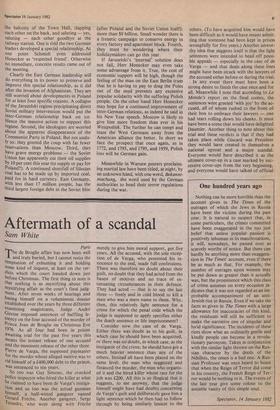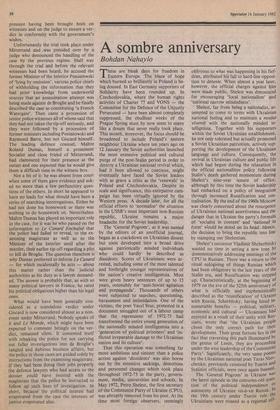Aftermath of a scandal
Sam White
The de Broglie affair has now been well and truly buried, but I cannot resist the temptation of exhuming it and holding some kind of inquest, at least on the ver- dicts which the court handed down just before Christmas. The first thing to note is that nothing is as mystifying about this Mystifying affair as the court's final judg- ment. After seven weeks of hearings and basing himself on a voluminous dossier established over the years by three different examining magistrates, Judge Andre Giresse imposed sentences of baffling le- niency on the four accused of the murder of Prince Jean de Broglie on Christmas Eve 1976. As all four had been in prison awaiting trial for the past five years this means the instant release of one accused and the imminent release of the other three. Pierre de Varga, the supposed paymaster for the murder whose alleged motive was to rid himself of a £400,000 debt to the prince, was sentenced to ten years.
So too was Guy Simone, the crooked Police inspector who hired the killer at what he claimed to have been de Varga's instiga-, tion and so too was the actual gunman himself, a half-witted gangster named Gerard Freche. Another gangster, Serge Tessedre, who went along with Freche merely to give him moral support, got five years. All the accused, with the sole excep- tion of de Varga, who protested his in- nocence to the end, made full confessions. There was therefore no doubt about their guilt, no doubt that they had acted from the basest of motives and no trace of ex- tenuating circumstances in their defence. They had acted — that is to say the last three — freely and in cold blood to kill a man who was a mere name to them. Why, then, this relatively light sentence for a crime for which the penal code which the judge is supposed to apply specifies either the death sentence or life imprisonment?
Consider now the case of de Varga. Either there was doubt as to his guilt, in which case he should have been acquitted, or there was no doubt, in which case, as the instigator of the crime, he should have got a much heavier sentence than any of the others. Instead all have been placed on the same level: the man who suggested and financed the murder, the man who organis- ed it and the hired killer whose rate for the job was £200. All this is so illogical that it suggests, to me anyway, that the judge himself might have had doubts concerning de Varga's guilt and deliberately gave him a light sentence which he then had to follow through by being similarly lenient to the others. (To have acquitted him would have been difficult as it would have meant admit- ting that someone had been kept in prison wrongfully for five years.) Another unwor- thy idea that suggests itself is that the light sentences were intended to head off possi- ble appeals — especially in the case of de Varga — and that deals along these lines might have been struck with the lawyers of the accused either before or during the trial.
In any event there must have been a strong desire to finish the case once and for all. Meanwhile I note that according to Le Monde's report on the final scenes, the sentences were greeted 'with joy' by the ac- cused, all of whom rushed to the front of their box to embrace their lawyers — one had tears rolling down his cheeks. It must have been a scene that would have delighted Daumier. Another thing to note about this trial and these verdicts is that if they had taken place while Giscard was President they would have created in themselves a national uproar and a major scandal. Everyone would have described it as the ultimate cover-up in a case marked by suc- cessive cover-ups from the very beginning, and everyone would have talked of official
pressure having been brought both on witnesses and on the judge to ensure a ver- dict in conformity with the government's wishes.
Unfortunately the trial took place under Mitterrand and was presided over by a judge who denounced the handling of the case by the previous regime. Half way through the trial and before the relevant witnesses had been heard, he accused the former Minister of the Interior Poniatowski of 'lying by omission', various police chiefs of withholding the information that they had prior knowledge from underworld sources that an assassination attempt was being made against de Broglie and he finally deScribed the case as constituting 'a French Watergate'. Then came a procession of senior police witnesses all of whom said that they had not taken the tip-off seriously, and they were followed by a procession of former ministers including Poniatowski and Raymond Barre, but not Giscard himself. The leading defence counsel, Maitre Roland Dumas, himself a prominent Socialist and close friend of Mitterrand, had clamoured for their presence at the outset and one expected that he would give them a difficult time in the witness box.
Not a bit of it: he was absent from court when some of them gave evidence and ask- ed no more than a few perfunctory ques- tions of the others. In short he appeared to have no leads for what should have been a series of searching interrogations. Either he had not done his homework or there was nothing to do homework on. Nevertheless Maitre Dumas has played an important role in the case, for it was he who passed on the information to Le Canard Enchalne that the police had failed to reveal, to the ex- amining magistrate as well as to the Minister of the Interior until after the murder, their earlier tip-off regarding a plot to kill de Broglie. The question therefore is why Dumas preferred to inform Le Canard — for which incidentally he acts — about this matter rather than the judicial authorities as his duty as a lawyer demand- ed. The answer is probably that, as with so many political lawyers in France, he rated his political obligations higher than his legal ones.
What would have been generally con- sidered as a scandalous verdict under Giscard is now considered almost as a non- event under Mitterrand. Nobody speaks of it and Le Monde, which might have been expected to comment bitingly on the ver- dict, remained silent. It contented itself with rebuking the police for not carrying out fuller investigations into de Broglie's tangled and dubious business affairs, but the police in those cases are guided solely by instructions from the examining magistrate. If they had been doing their jobs properly the defence lawyers who had access to the dossier could have insisted with the magistrate that the police be instructed to follow up such lines of investigation. In short, because the political interest had evaporated from the case the interests of justice evaporated also.



































 Previous page
Previous page